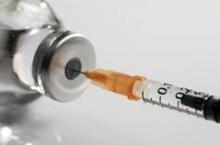SAN FRANCISCO – Patients with diabetes have an increased incidence for a number of infections, but vaccine-preventable diseases need not be among them.
"In the risk/benefit category, there’s a lot of potential benefit to these" immunizations, Dr. David Parenti said at the annual advanced postgraduate course held by the American Diabetes Association.
Studies have shown that patients with diabetes who are aged 23-59 years have a twofold higher relative risk of acute hepatitis B virus, compared with those without diabetes. In addition, the diabetic case fatality rate is more than double, at about 5%.
Individual glucose monitoring has reduced the transmission of hepatitis B virus by contaminated medical equipment, but outbreaks still occur in a variety of settings because of lapses in infection control, said Dr. Parenti, professor of medicine at George Washington University, Washington.
Still, vaccination rates are no better among patients with diabetes than those without. From 1999-2004 to 2005-2008, vaccination rates inched up only slightly among diabetics for both hepatitis A (9.3% to 15.4%) and hepatitis B (15.2% to 22.4%), according to National Health and Nutrition Examination Surveys (Hepatology 2011;54:1167-78).
Indeed, a show of hands revealed that less than a dozen of the roughly 500 attendees at the meeting had vaccinated their patients.
"I do think hepatitis B vaccination is important, but the question is: How do you know whether it works and how do you monitor it?" Dr. Parenti said.
A variety of factors can impair the immunogenicity of the hepatitis B vaccine, including gluteal or intradermal administration, increased age, higher body mass index, and genetics, such as human leukocyte antigen-DR3, which is present in about 95% of people with type 1 diabetes.
Unpublished data from the Centers for Disease Control and Prevention suggest that diabetes patients experience a similar drop in seroprotection with age (80% at 41-59 years, 65% at 60-69 years, and less than 40% at 70 years and older), he noted.
For patients who fail to respond to the first or second series of vaccinations, based on postimmunization serologic testing, using a higher 40 mcg-dose or four doses at 0, 1, 2, and 6 months has been shown to improve immunologic responses. There is no need, however, to restart a series if it was interrupted, regardless of the duration between vaccinations, Dr. Parenti said.
Only about 15% of individuals receive the herpes zoster vaccination, approved for persons aged 50 years and older, despite a third of the population expected to develop shingles within their lifetime. The risk is nearly doubled among diabetics under age 49 years with a hemoglobin A1c exceeding 8%, he said.
For those who do get vaccinated, however, a small Japanese study (J. Infect. 2013;67:215-9) reported similar humoral and cellular responses 3 and 6 months postvaccination among patients aged 60-70 years, with and without diabetes, he noted.
One attendee said that Medicare often refuses to cover herpes zoster and hepatitis vaccinations, leading her to remark, "It’s kind of turning into a class issue. My patients with money will get the vaccine."
It’s not just Medicare, but a significant number of other insurers who aren’t paying for the vaccines, particularly the pricey $300-$400 zoster vaccine, Dr. Parenti replied. Much depends on the patient’s plan. For example, the shingles vaccine is covered by Medicare Part D, but not Part A or Part B, while Medicare Part B covers recipients at "high or medium risk" for hepatitis B, including those with diabetes or end-stage renal disease. At this point, prior authorization is needed for all insurers, including Medicare, and appeals may be necessary, he said.
Dr. Parenti reported serving on a data safety monitoring board for the National Institute of Allergy and Infectious Diseases and receiving research support from Merck, Pfizer, Cubist Pharmaceuticals, Janssen Pharmaceuticals, Insight, and the National Institutes of Health.


